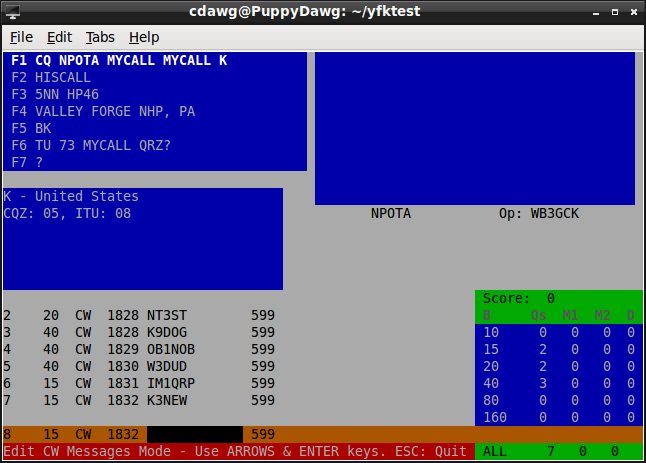I’m planning to take part in ARRL’s National Parks on the Air (NPOTA) event next year. In fact, I plan to activate Valley Forge National Historic Park on New Year’s Day. It will likely be cold so I plan to operate “stationary-mobile” from the cab of my pickup truck. I suspect there will be a lot of “chaser” stations so I’m planning to use a computer for logging and sending CW.
I considered a couple of options. One is to use N3FJP’s ACLog on my Windows laptop. I use ACLog for my main log and I’m very comfortable with it. The drawback is that my Windows laptop might be a bit large for the cramped cab of my little truck. That led me to using my little Acer netbook computer, which runs Ubuntu Linux.
In my search for a contest-type logger for Linux, I tried several programs before stumbling across one called YFKtest. YFKtest satisfied my three main requirements for a logging program:
- It has to be simple to use with keyboard input only; I don’t want to have to use a mouse.
- It needs to provide programmable CW messages and be able to key my transmitter.
- It has to have the ability to export logs as ADIF files that I can import into my main log.

Fabian DJ1YFK is YFKtest’s original author while Bob Finch WY9A currently maintains the software. Since it has been around for a while, the code base is stable. YFKtest is a PERL program, so it runs under Linux. It supports a large number of contests, including some QRP contests. It generates CW over a serial or parallel interface, as well as via Winkey. It works with the same serial interface that I use with the N3FJP software, so that’s a plus. If you are so inclined, YFKtest will do rig control using the hamlib utilities. It also generates ADIF, Cabrillo and contest summary files.

Installation on Linux was straight-forward. The user interface is a bit “old school,” compared to other logging software. It was, however, easy to configure and use. For NPOTA use, I took the “DXPED.def” definition file for DXpeditions and made a few minor tweaks to it. To give myself some peace of mind, I created a cron job in Linux that automatically backs up my log files to an SD memory card every 15 minutes.
YFKtest is hard coded for “599” or “59” signal reports. There may be a way to accommodate honest signal reports, but I haven’t explored that yet. Since LoTW doesn’t use signal reports, this is a non-issue for NPOTA logging.
Bob Finch’s support is top-notch. During my initial testing with it, I reported a bug in the ADIF files. In a day or two, Bob uploaded a fix. You can’t complain about support like that.
So, I’m going to give YFKtest a shot for my New Year’s Day operation. I’m anticipating a lot of NPOTA activity on the first day and that YFKtest will help me keep up with it!
For more information, visit the YFKtest website.
72, Craig WB3GCK